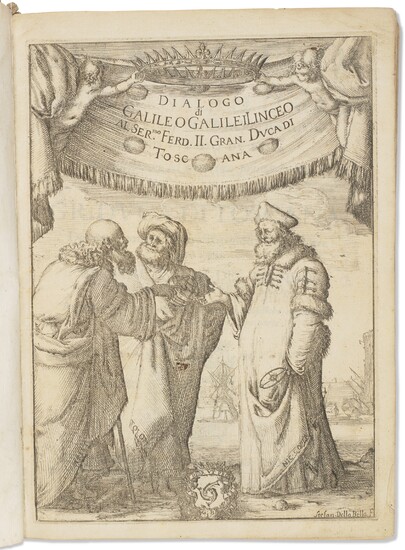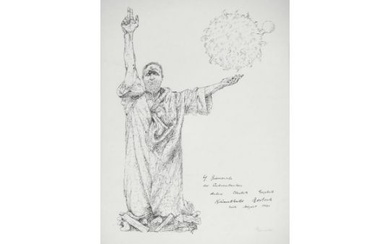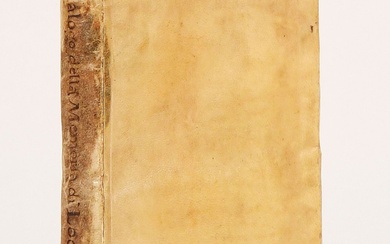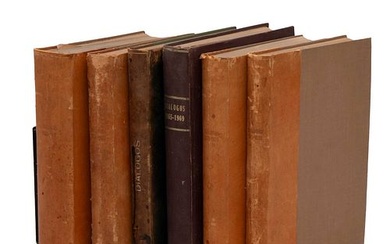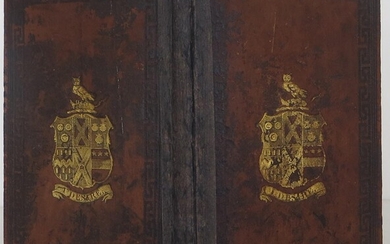Dialogo
GALILEI, Galileo (1564-1642). Dialogo ... sopre i due massimi sistemi del mondo Tolemaico, e Copernicano. Florence: Giovanni Battista Landini, 1632.
First edition of Galilei's famous defense of Copernican heliocentrism; the direct cause of his trial and imprisonment. In 1624, eight years after being forbidden to promulgate heliocentrism by the previous pope, Galileo was granted permission to write on the subject by the new Pope Urban VIII, his friend and patron for more than a decade—on the condition that Aristotelian and Copernican theories were put forward equally and impartially. To this end, Galileo wrote his work as a dialogue between Salviati, a Copernican, and Simplicio ("Dummy"), an upholder of the geocentric Ptolemaic and Aristotelian orthodoxy. Far from impartial, the work "is a masterly polemic for the new science. It displays all the great discoveries in the heavens which the ancients had ignored" (PMM). For this, Galileo lost the support of Urban VIII and was called to Rome for trial by the Inquisition. His sentence of life imprisonment was immediately commuted to permanent house arrest and the Dialogo was placed on the Index, where it remained until 1832. Carli and Favaro, p. 28; Cinti 89; Dibner, Heralds 8; Grolier/Horblit 18c; Norman 858; PMM 128.
Quarto (217 x 155mm). With the errata leaf, pasted-on correction slip on p.92, and manuscript addition of letter H to diagram on p.192. Engraved frontispiece by Stefano della Bella, woodcut Landini device on title, 31 woodcut text diagrams and illustrations, woodcut ornamental initials, type-ornament head- and tailpieces and factotum initials (top portion of leaf O2 torn away affecting about 3 lines of text, some toning). Old vellum (backstrip almost entirely lacking, a little dampstain); custom box and chemise. Provenance: effaced description on first blank – M. Conte (signature on title).
View it on
Sale price
Estimate
Time, Location
Auction House
GALILEI, Galileo (1564-1642). Dialogo ... sopre i due massimi sistemi del mondo Tolemaico, e Copernicano. Florence: Giovanni Battista Landini, 1632.
First edition of Galilei's famous defense of Copernican heliocentrism; the direct cause of his trial and imprisonment. In 1624, eight years after being forbidden to promulgate heliocentrism by the previous pope, Galileo was granted permission to write on the subject by the new Pope Urban VIII, his friend and patron for more than a decade—on the condition that Aristotelian and Copernican theories were put forward equally and impartially. To this end, Galileo wrote his work as a dialogue between Salviati, a Copernican, and Simplicio ("Dummy"), an upholder of the geocentric Ptolemaic and Aristotelian orthodoxy. Far from impartial, the work "is a masterly polemic for the new science. It displays all the great discoveries in the heavens which the ancients had ignored" (PMM). For this, Galileo lost the support of Urban VIII and was called to Rome for trial by the Inquisition. His sentence of life imprisonment was immediately commuted to permanent house arrest and the Dialogo was placed on the Index, where it remained until 1832. Carli and Favaro, p. 28; Cinti 89; Dibner, Heralds 8; Grolier/Horblit 18c; Norman 858; PMM 128.
Quarto (217 x 155mm). With the errata leaf, pasted-on correction slip on p.92, and manuscript addition of letter H to diagram on p.192. Engraved frontispiece by Stefano della Bella, woodcut Landini device on title, 31 woodcut text diagrams and illustrations, woodcut ornamental initials, type-ornament head- and tailpieces and factotum initials (top portion of leaf O2 torn away affecting about 3 lines of text, some toning). Old vellum (backstrip almost entirely lacking, a little dampstain); custom box and chemise. Provenance: effaced description on first blank – M. Conte (signature on title).
